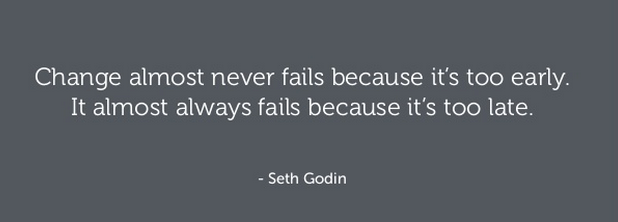Dealing with alterations to your
normal work procedures can be frustrating, unwanted, and even scary. Learning
to accept change at work is critical for your success. The key is to understand
the change and to position yourself to receive the benefits so that you can
excel despite the challenges. Implement these strategies to guide you towards
embracing workplace changes with optimism for greater success at work.
(1)
UNDERSTAND YOUR CONCERNS ABOUT THE CHANGE. Ask
yourself what scares you or makes you angry about a recent change at work. Once
you know you’re concerns you will be able to deal with them to better succeed
in the work environment. Maybe you think your job or paycheck is threatened.
Perhaps you think the company might close because of the change. Explore all
the possibilities. If you find that your concerns are legitimate, create
a Plan B that you can implement in your worst-case scenarios. Once you
make an action plan, resolve to let go of your uneasiness about situations you
can't control and optimistically expect the best results that could happen from
the change.
(2)
TRUST THE CHANGE. Be assured that the people
running the company are making the choice to change for a reason that will
benefit the company. Recognize that people in power have a picture of the
entire situation. When I exited my career at a Fortune 100 company, the organization
was at the beginning stages of implementing a new commercial strategy. I was
part of the “Change” team so I had insight that others did not have. I
understood the importance of the changes as they were necessary to maintain a
healthy position in the industry. However, co-workers with less information
were not as optimistic in embracing the changes. The changes didn't limit me.
They empowered me! Be committed to the goals of the organization to lessen your
anxieties about the change to perform at your optimal level. If it’s best the
company ultimately it’s best for you.
(3) LIMIT “CHANGE” CONVERSATIONS. Avoid
lengthy discussions with co-workers about changes, especially if your peers are
focusing on negativity related to the changes. Some co-workers might be
antagonistic due to their own fears and insecurities. Negative talk spreads
like a cancer. Stay immunized by declining to share thoughts that might be
interpreted as negative when engaging with others. Instead make an effort to be
understanding and communicate thoughts about the positive results the change
should bring.
(4)
ACCEPT THE CHANGE. Recognize that an important
aspect of your work is to support the management and carry out your leaders'
directives. Simplify the situation for yourself by pledging to respect the
changes and perform your duties as required. You are there for a purpose. That
purpose is to do your job well, improve your skills and earn a paycheck. Stay
focused on your goals and strive for excellence, regardless of the situation.
(5)
WELCOME THE CHANGE. Make a decision to face the
change head-on and do whatever it takes to glean positive results from the new
plans. Challenge yourself and have confidence that you can handle it. Your work
situation might actually improve because of the new changes. This could be a
time of rejuvenation, renewal and newfound efficiency. Be patient throughout
the implementation process. And allow yourself to expect your work situation to
benefit your greater good.
Although changes at work might be
scary and unwanted, open your mind to the possibilities of change. Change
provides an opportunity for skill building and new career experiences. Put some
of these strategies into practice if changes occur where you work so you won’t
be a part of the millions who aren't engaged. Make it a purposeful decision –
not a fleeting thought! You CAN embrace change at work and experience greater
fulfillment with positivity, confidence, and patience!
If
these topics interest you, please connect with me on social media or leave a comment. Thanks for visiting!








